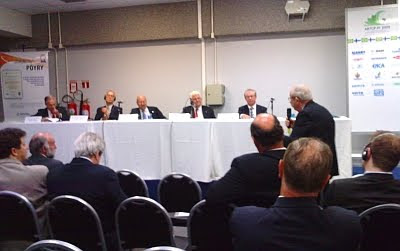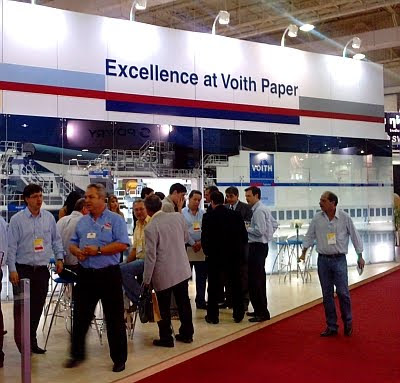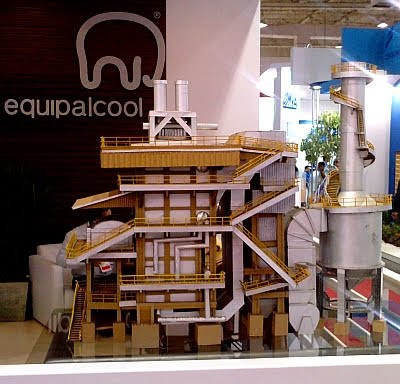ABTCP-PI 2009 takes off!

The 42nd International Congress & Exhibition on Cellulose Pulp & Paper (ABTCP-PI 2009), organized by the Brazilian Technical Association for Cellulose Pulp & Paper was launched in Sao Paulo on Monday. Key persons within the industry gather at this meeting point to share their latest information and research results. In addition, a wonderful set up of exhibitors have filled up the Exhibition Fair Area, displaying their products and services to an audience that will reach several thousands.

Fig. 1: Debate at the ABTCP-PI 2009 Technical Sessions
Eucalyptologics has the privilege to observe and report from the Technical Sessions, which is indeed a great place to see how the big fishes in the P&P pond report their findings and predictions for future trends.
Crisis Impacts on the Global Pulp & Paper Industry
Carlos Farinha, senior vice-president Pöyry, outlined the current status and predicted the evolution of and future tendencies for the global Pulp & Paper market after the impact of the Global Crisis. Key points, predictions for increasing overall demand up to at least 2025 to possibly go beyond the 525 Million ton paper / year, and different impacts and tendency for each regional market. The Crisis impacted greatly the newsprint paper segments, but tissue and printing paper remained afloat. China became the main market for Brazilian Kraft Eucalyptus pulp during 2009, while exports to Europe fell sharply. Carlos also outlined that while the European Union, the USA and Japan will drive just a small piece of the future demand growth rate cake, current demand growth rates point to China, India & Russia as the main future markets we should look at for expansion.

Fig. 2: Jaako Pöyry's stand at ABTCP-PI 2009 Exhibition Area
Another important point for those growing eucalypts, or for those against growing eucalypts, Bleached Hardwood Kraft Pulp (so, one of the main products from planted Eucalyptus forests) is predicted to jump from 60 to 85% over the total sources for printing paper manufacture by 2025, and from 60 to 75% for tissue. Which means that in some years, less than 0.5% of the world's available land will be able to supply most of the raw renewable, recyclable and sustainable resource as to sustain the production of the huge majority of printing and tissue paper consumption around the world. And, mostly, without using dangerous chlorine chemicals for bleaching. No doubt, good news for those misguided to think that using paper equals to chopping trees and destroying native forests, or those misguided to believe some of the most dangerous toxins are still generated by the P&P routine.
Crisis Impacts on the European & Brazilian Pulp & Paper Industry
Kurt Brandauer, executive vice-president VOITHPaper GmbH & Co. KG, described the impacts of the crisis in Europe, which meant a sharp decline of demand reaching even a 25% decrease for some paper segments. and outlined that while countries as China are implementing major "close down" policies for their smaller factories, Europe is closing down big ones too. In the first case, it is a modernization effort to get rid of "many, small, pollutant, suboptimal" industrial complexes processing several sources of cellulose and replace them by "fewer, less pollutant, larger, more efficient, more profitable" factories processing fiber from sustainable fast growing plantations. For Europe it is however a response for non satisfactory financial productivity in the global scenario, plus a strong social pressure for increasing recycled paper use. Fiber is cheaper to produce and process elsewhere. And can be recycled later if needed.

Fig. 3: VOITH Paper stand at the ABTCP-PI 2009 Exhibition area.
Elizabeth de Carvalhaes, President of BRACELPA, outlined the impacts of the crisis for Brazil. Brazilian pulp exports kept growing steadily, driven by Chinese imports to a new record. But this happened as pulp prices fell sharply from a peak of nearly 800 US$ per ton by November 2008 to a low of 485 US$ per ton by April 2009. Cheap, very good, high quality certified Brazilian ECF Eucalyptus pulp for high quality paper... plus at least 300 million Chinese citizens increasing their paper consumption rates as their living standards improve... who can resist? After a wise SWAT analysis, key point: Brazilian industry captures 3 ton of CO2 for each ton emitted. That, considering they are leading the world for Eucalyptus plantation area and planting rate, means a growing sizeable bargaining power for carbon market negotiations.
Crisis Impacts on the Asian & Australasian Pulp & Paper Industry
Kunitawa Toyofuku san, executive director Japan TAPPI, outlined the great efforts taken by Japan to become one of the top users of recycled paper in the world, reaching 75% of total internal demand, and the great efforts to reduce the basic weight for newsprint paper, half by surface unit than it was 30 years ago. The sharp increase of Chinese imports of Japanese waste paper (special commodity for Sino-Japanese trade) during 2009 was also a key point: even more fiber to feed the giant panda. Japan warned about the impact of future surging demand that may rise from China as per capita paper consumption rates increase with time, and how while Japanese paper production remained nearly estabilized in the last decade, China has trebled them in few years, and it is predicted to keep increasing. An outline of Japanese investments in fast growing plantations around the world (cheers to Australia & New Zealand, among other Eucalyptus planters) was also given.

Fig. 4: Did you think Eucalyptus cellulosic ethanol bio-refineries do not exist?
Finally, Paulo Sérgio Peres, President of ABPO, outlined the importance of corrugated paper for packaging in the world markets (90 Million ton per year), and how, again, current growth is lead by Asia, where China has already surpassed the USA as world leading producer. In addition, he perfectly explained why packaging paper is a very good indicator to follow the evolution of crisis: while food packaging use remains almost constant (we all have to eat, crisis or not) all other packaging is directly linked to final consumer habits. And that means the very scary sharp decline to unheard of levels by December 2008, meaning a nearly paralyzed import-export process for three months while the worst of the financial bubble exploded and panic spread all over the world... is not just over. Packaging paper consumption rates have already recovered and are approaching new historical maximums. That means, your and my consumer habits are recovered, and the flux of money is surely helping the world economy recover. If I was you, I would invest some in fast growing tree planting. The trees kept growing while the crisis was at its peak (or low, depends on perspective!).
And what else?
Eucalyptologics was also a honest witness of the efforts of Brazilian P&P industry to reduce its environmental impact footprint: new technologies were presented to improve the treatment of Kraft pulp mill effluents and to reduce the amount of bio-solids produced as residues of industrial activity (pulp and paper, but also other industrial cycles). In addition, monitoring plans and infrastructures to follow water and air pollution trends were also kindly presented. Not very good news for those making noise about the "guilty pollutant chemical industries" in the pulp and paper segments. The industry is not just aiming at complying with law and regulations: it is aiming at "zero residue policies" where possible.
Want to contact us?

Contact GIT Forestry Consulting - Eucalyptologics

GIT's Eucalyptology Topics
© 2007-2009 Gustavo Iglesias Trabado. Please contact us if you want to use all or part of this text and photography elsewhere. We like to share, but we do not like rudeness.



































![Validate my Atom 1.0 feed [Valid Atom 1.0]](http://gus.iglesias.googlepages.com/valid-atom.png)

















5 Comments by our readers :::
Cellulosic Pulp Production increases in Brazil
(May 10th 2010)
"Brazilian pulp & paper industry closed the First Quarter of 2010 with better results than those achieved before the global financial crisis"
"According to Bracelpa, this performance is an indicator of a sustained tendency during 2010, and an indicator of economic recovery for global markets"
"During the 1Q 2010, pulp production reached 3.5 Million tones, meaning +13% growth compared to 1Q 2009"
"Pulp exports +19% to 2.2 Million ton, driven by stronger demand in Europe & China"
Source: Bracelpa via Guía Forestal via Más Producción.
Brazilian Eucalyptus Prices Grow
June 24th 2010
"Eucalyptus log prices in Brazil have gone +25% the past year, almost reaching the global average hardwood fiber price index in the 1Q/2010."
"The supply & demand for Eucalyptus logs in Brazil has been in balance the past year, which has resulted in stable log prices in the local currency, according to the WRQ. As a result of a stronger Real, log costs in US$ terms were +25% in the 1Q/10 vs. 1Q/09"
Source: WRQ / WRI
Brazil: 20,000,000,000 US$ to plant more trees... and to build more pulp mills in the next cultivation cycle.
(July 5th 2010)
Brazilian Companies Invest to Grow
By Elizabeth de Carvalhaes, Executive President, Brazilian Pulp & Paper Association (Bracelpa)
"The economy's promising outlook and the emerging markets' increase in demand - such as in China - led the pulp and paper industry to resume its investment programs of the past months, postponed in 2009 due to the international financial crisis."
"In the next seven years - which corresponds to the new planted forest cycle, currently just beginning - approximately US$ 20 billion will be invested in the country's forest-base and in the construction of new mills."
"At the end of 2017, which simultaneously occurs with the mentioned forestry cycle, Brazilian pulp production is expected to go from the current 13.4 million annual tons to 20 million annual tons."
"Also, during this period, paper production will increase from 9.3 million tons to 12.5 million tons, and planted forest areas will grow by 25%."
"Brazilian pulp and paper industry is prepared to grow without significantly expanding its land occupation, a fact which largely contributes to the environment. Moreover, the country has 72 million top soil hectares available for cultivation"
Source: Bracelpa via RISI
Brazil: Cellulosic Pulp exports +8% during first half of 2010.
Pulp production +9%, reaching 6.9 Million ton. Exports to Europe +81%. Exports to the USA +47%
Source: Bracelpa + IN + CelOnline.
(Corolary: THE CRISIS IS OVER :-)
Value of Brazilian exports of pulp & paper during 2010 (compared to 2009, 2nd year of the crisis):
Fibria (Votorantim Celulose + Aracruz) +285%
Celulose Nipo-Brasileira +80%
Suzano Papel e Celulose +35%
International Paper do Brasil +25%
Klabin +25%
Veracel (Fibria + Stora Enso) +3%
Combined sales = 4,841,000,000 US$ = 3,850 Million €
Yes, the crisis was over :-)
Send a comment to EUCALYPTOLOGICS